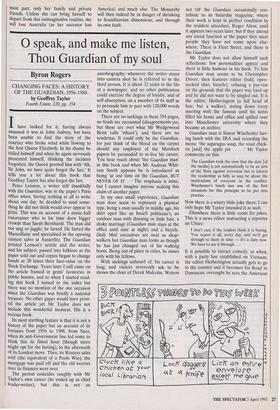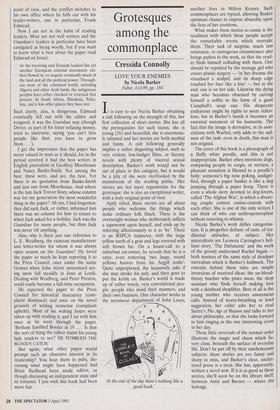0 speak, and make me listen, Thou Guardian of my
soul
Byron Rogers
CHANGING FACES: A HISTORY OF THE GUARDIAN, 1956-1988 by Geoffrey Taylor Fourth Estate, f20, pp. 354 Ihave looked for it, having always assumed it was in John Aubrey, but have been unable to find the story of the courtier who broke wind while bowing to the first Queen Elizabeth. In his shame he exiled himself and when he again nervously presented himself, thinking the incident forgotten, the Queen greeted him with `Ah, Sir John, we have quite forgot the fart.' It tells you a lot about this book that Geoffrey Taylor has also forgot the fart.
Peter Lennon, a writer still thankfully with the Guardian, was in the paper's Paris office when, having nothing at all to write about one day, he decided to send some- thing he did not think would ever appear in print. This was an account of a music-hall entertainer who in his time drew bigger crowds than Sarah Bernhardt. The man did not sing or juggle; he farted. He farted the Marseillaise and specialised in the opening cannon salvo at Austerlitz. The Guardian printed Lennon's article and the writer, and his subject, passed into folklore as the paper sold out and copies began to change hands at 20 times their face-value on the Stock Exchange. Years later I still came on the article framed in gents' lavatories in public houses, and so when I started read- ing this book I turned to the index but there was no mention of the one occasion when the Guardian was briefly a national treasure. No other paper would have print- ed the article yet Mr Taylor does not include this wonderful moment. His is a serious book.
Its most startling feature is that it is not a history of the paper but an account of its fortunes from 1956 to 1988, from Suez, when its anti-Government line led some to think this its finest hour (though more might opt for the farting), to the aftermath of its London move. Then, its Reuters sales sold (the equivalent of a Pools Win), the mortgage was paid off and the old worries over its finances were over.
The period coincides roughly with Mr Taylor's own career (he ended up as chief leader-writer), but this is not an autobiography; whenever the writer strays into camera shot he is referred to in the third person. It is about 32 years in the life of a newspaper, and no other publication could exercise the degree of loyalty, and of self-absorption, on a member of its staff as to persuade him to part with 120,000 words on the subject.
There are no sackings in these 354 pages, no feuds are recounted (disagreements yes, but these are over what Mr Wedgewood Benn calls ishues'), and there are no vendettas. It could only be the Guardian, for just think of the blood on the carpet should any employee of the Murdoch papers be persuaded to re-live his career. You hear much about 'the Guardian man' in this book and when Mr Andreas Whit- tam Smith appears he is introduced as being 'at one time on the Guardian, BUT NEVER OF IT. . .' The emphasis is mine, but I cannot imagine anyone making this claim of another paper.
In my own small experience, Guardian man does seem to represent a physical type, being a man usually in middle age, his shirt open like an Israeli politician's, an outdoor man with thinning or little hair, a shaky marriage (Guardian man stays at the office until nine at night) and a bicycle. Daily Mail executives are neat as shop- walkers but Guardian man looks as though he has just changed out of his walking boots. Being out of place in cities, he mixes only with his fellows.
With sackings unheard of, his career is long, and visitors reverently ask to be shown the chair of Derek Malcolm. Writers not OF the Guardian occasionally con- tribute to its Saturday magazine, where their work is kept in perfect condition by the resident attendant, Roger Alton, until it appears two years later, but if they attend any social function at the paper they meet people they have not come upon else- where. There is Fleet Street, and there is the Guardian.
Mr Taylor does not allow himself such reflections: few personalities appear and there is little humour in his book. To him Guardian man seems to be Christopher Driver, then features editor (bald, open- necked shirt, bicycle), refusing a pay-rise on the grounds that the paper was hard up and he did not want to be singled out. It is the editor, Hetherington (a full head of hair, but a walker), noting down every meeting with the famous until his notes filled his home and office and spilled over into Manchester university where they became an archive.
Guardian man is Simon Winchester hav- ing lunch with the IRA and recording the menu: 'the asparagus soup, the roast chick- en [and] the apple pie . . . .' Mr Taylor comments on this: The Guardian took the view that the duty [of the media] is not automatically to be an arm of the State against terrorism but to inform the readership as fully as may be about the motivations of everyone in the conflict. Winchester's lunch was one of the first occasions for this principle to be put into practice ...
Now there is a wintry little joke there; I can only hope Mr Taylor intended it as such.
Elsewhere there is little room for jokes. This is a news editor instructing a reporter on Ulster:
I don't care if the readers think it is boring. You report it all, every day, and we'll get through to them in time — it's a duty now. We have to see it through ...
It is possible to extract comedy, as when, with a party line established on Vietnam, the editor Hetherington actually gets to go to the country and it becomes his Road to Damascus; overnight he sees the American point of view, and the conflict switches to his own office where he falls out with his leader-writers, one in particular, Frank Edmead.
Now I am not in the habit of reading leaders. Most are not well written and the Guardian's leaders in particular have been castigated as being woolly, but if you want to know what is best about the paper read Edmead on Israel:
At the receiving end Zionism looked like yet another European colonial movement: set- tlers flowed in, to acquire eventually much of the land and all the political power. Through- out most of the colonised world, including Algeria and other Arab lands, the indigenous peoples have either checked or reversed that process. In South Africa, Rhodesia, Pales- tine, and a few other places they have not ...
Such clarity, alas, is dangerous. Edmead eventually fell out with his editor and resigned; it was the Guardian way (though Driver, as part of his letter refusing money, tried to intervene, saying 'you can't hire people like that; you have to grow them ...).
I get the impression that the paper has never valued its stars as it should, for in the period covered it had the best writers in English journalism in Geoffrey Moorhouse and Nancy Banks-Smith. Not among the best: these were, and are, the best. Yet there is no quotation from Banks-Smith and just one from Moorhouse. And where is the late Jack Trevor Story, whose column was for my generation the most wonderful thing in the paper? Ah yes, I had forgotten; they did sack Jack, or rather, informed him there was no column for him to return to when Jack asked for a holiday. Jack was the Guardian for many people, but then Jack was never OF anything.
Also, why is there just one reference to L. E. Weidberg, the raincoat manufacturer and letter-writer for whom it was always open season on the Guardian? He loved the paper so much he kept reporting it to the Press Council, once under the name Gomez when John Arlott announced see- ing snow fall steadily in June at Lords. Dealing with Weidberg, said Peter Preston, could easily become a full-time occupation.
He reported the paper to the Press Council for historical inaccuracy (com- plaint dismissed) and once on the novel grounds of writing nonsense (complaint upheld). Most of his waking hours were taken up with reading it, and I sat with him once as he went through the pages. `Botham fumbled Border at 19 . . . Is that the sort of thing the editor wants his young lady readers to see? HE FUMBLED THE BLOODY CATCH.'
But again, what other paper would prompt such an obsessive interest in its readership? You hear them in pubs, dis- cussing what might have happened had Brian Redhead been made editor, as though discussing an independent state and its fortunes. I just wish this book had been more fun.



















































 Previous page
Previous page